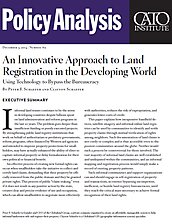Informal land tenure continues to be the norm in developing countries despite billions spent on land administration and reform programs in the last 20 years. The problem goes deeper than insufficient funding or poorly executed projects. By strengthening public land registry institutions that work on behalf of authoritarian or predatory governments, reform programs, often financed by Western aid agencies and intended to improve property protections for smallholders, may have actually enhanced the ability of elites to capture informal property or delay formalization for their own political or financial benefit.
An effective process of creating new formal rights can occur when smallholders take the initiative to collect and certify land claims, demanding that their property be officially removed from the public domain and they be granted private rights. This process of public “claim-staking,” even if it does not result in any positive action by the state, creates clear and precise evidence of use and occupation, which can allow smallholders to negotiate more effectively with authorities, reduces the risk of expropriation, and generates lower costs of credit.
This paper explains how inexpensive handheld devices, satellite imagery, and informal online land registries can be used by communities to identify and settle property claims through mutual verification of rights among neighbors. Such documentation of land claims is not costly or complex and is thus accessible even to the poorest communities around the globe. Neither would such a process be controversial for those involved. The vast majority of informal land claims are well established and undisputed within the communities, and an informal mapping and registration process would simply make a record of existing property patterns.
Such informal communities and support organizations can and should engage in self-registration of property and transactions, in essence bypassing incompetent, inefficient, or hostile land registry bureaucracies, until they reach the critical mass necessary to achieve formal recognition of their land rights.
